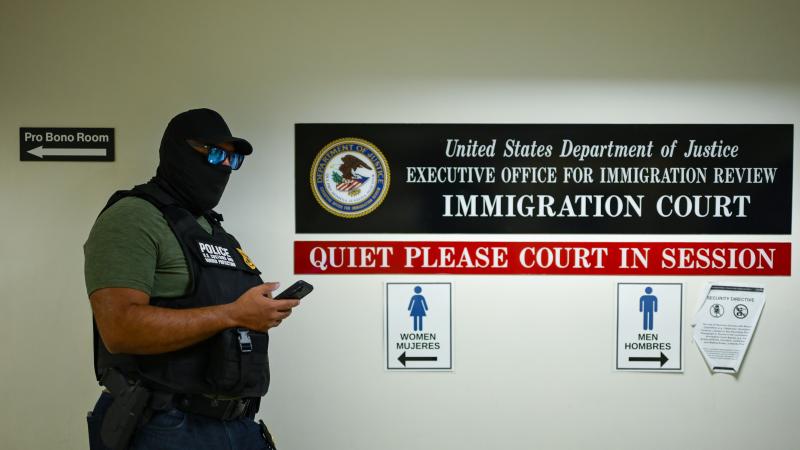Trump signs executive order to secure U.S. pharmaceutical supply chain
An empty reserve undermines national preparedness for health crises like pandemics and bioterrorism where rapid access to critical medicines is essential.
On Wednesday, President Trump signed an executive order to bolster the nation’s pharmaceutical supply chain by filling the Strategic Active Pharmaceutical Ingredients Reserve (SAPIR) with critical drug components. The move aims to reduce a jarring reliance on foreign manufacturers, particularly from adversarial nations like China, and ensure a stable supply of essential medicines and medical supplies.
Senator Roger "Doc" Marshall, R-Kans., spoke to the Just The News, No Noise television show Thursday night and stressed, "It's vital to be independent. Could you imagine if we are in a war with say, China, who makes about 90% of our active pharmaceutical ingredients? We could easily be without antibiotics, antivirals, insulin, insulin, like drugs, beta blockers."
The order directs the Office of the Assistant Secretary for Preparedness and Response (ASPR) within the Department of Health and Human Services to identify approximately 26 critical drugs vital for national health and security.
In particular, ASPR is tasked with securing a six-month supply of active pharmaceutical ingredients (APIs) for these drugs, prioritizing domestically produced APIs when possible, to be stored in the SAPIR. The order also mandates updating a 2022 list of 86 essential medicines and developing a plan to stockpile a six-month API supply for these drugs, alongside proposing a second SAPIR repository to further enhance resilience.
The SAPIR was established in 2020 under the first Trump administration but has been nearly empty, primarily due to the Biden administration's failure to advance the initiative. Despite significant funding allocated to secure supply chains, domestic production and procurement of APIs did not increase as intended, leaving the reserve understocked for half a decade.
Think about Joe Biden. He emptied our emergency stockpiles of oil. He paid no attention to this. President Trump is going to fill up these emergency stockpiles," Marshall added.
The initiative addresses a critical vulnerability in the U.S. pharmaceutical supply chain, where only about 10% of APIs for prescription drugs are manufactured domestically, leaving the nation dependent on foreign suppliers. The White House criticized the previous administration for failing to promote or incentivize U.S. production or fill the SAPIR, despite significant spending on supply chain initiatives. “Overreliance on foreign nations for key starting materials and APIs risks shortages of essential medicines,” the White House said, emphasizing that APIs are cost-effective to stockpile due to their longer shelf life.
Where America gets its APIs: Mostly India and China
According to The United States Pharmacopeial Convention, an independent, nonprofit scientific organization, a 2019 FDA analysis showed that 72 percent of API facilities supplying the U.S. market are overseas. The organization also noted that they examined trends in API manufacturing volume across countries, finding that India and the European Union (EU) collectively supply over half of the APIs in U.S. prescription medicines. Additionally, significant concentrations in India and China together command the largest installed API manufacturing capacity in the world.
Compiling and comparing the data is difficult, because the many different types of drugs and their thousands of ingredients fall under various categories, including by use, and whether they are allowed to be produced without a license from the inventor, also called "generic." The Coalition for a Prosperous America (CPA), a non-profit trade association, says that as of last year, 90% of all antiviral and antibiotic medications were reliant on active pharmaceutical ingredients (API) not found in the U.S.
CPA explains that "most of the generic drugs consumed in the U.S. come from India, Israel and parts of Europe. China is the lead supplier of key starting materials used to mix drugs in labs in India that eventually get shipped to the U.S. either as finished product, or sent to U.S. subsidiaries and commercial partners who repackage the drugs, sometimes turning the ingredients into pills and tablets."
Not just a public health crisis, but a national security issue
The national security implications of pharmaceutical reliance on China were highlighted by multiple lawmakers on the Just The News, No Noise television show in July and White House Press Secretary Karoline Leavitt was asked about the crisis at a White House briefing on July 31. Now, the Trump administration is making pharmaceutical self-reliance a priority, building on his earlier efforts. In May 2025, he issued another executive order to reduce regulatory barriers and promote domestic drug manufacturing, alongside implementing most-favored-nation drug pricing to lower costs for Americans. The administration is also working to address price disparities, noting that Americans often pay up to three times more for the same drugs compared to other developed nations.
Trump’s recent moves further his “America First” plan to bring back U.S. manufacturing strength across all industries. The White House says new trade policies are already boosting domestic production, with companies growing their U.S. operations because of these changes. The administration is also exploring selling drugs directly to patients to cut out middlemen known as Pharmacy Benefit Managers (PBM) and reduce costs, shaking up the pharmaceutical industry.
APIIC, a non-profit organization dedicated to strengthening national health security and focusing on APIs, published a white paper in March of this year pointing out that "In September 2024, more than 320 essential medicines were on an American Society of Health-System Pharmacists’ shortage list — an all-time high at that point." The APIIC's publication highlights structures for private-public cooperative ventures to address the shortages, seemingly in alignment with the president's “America First” plan.
U.S.-manufactured drugs consist primarily of brand-name pharmaceuticals, not generic and basic APIs. As a result, lobbyists, industry experts and lawmakers will likely debate the order’s implications, particularly the feasibility of adjusting domestic API production amidst global market complexities. Critics may point to challenges in competing with lower-cost foreign manufacturers, while supporters argue the move is essential for national security and public health.
Applauding Trump's efforts to protect American interests, Marshall said, "The Biden administration sat on this issue since Covid and with President Trump's pen, I hope he solved the problem and our nation is going to be safer."













